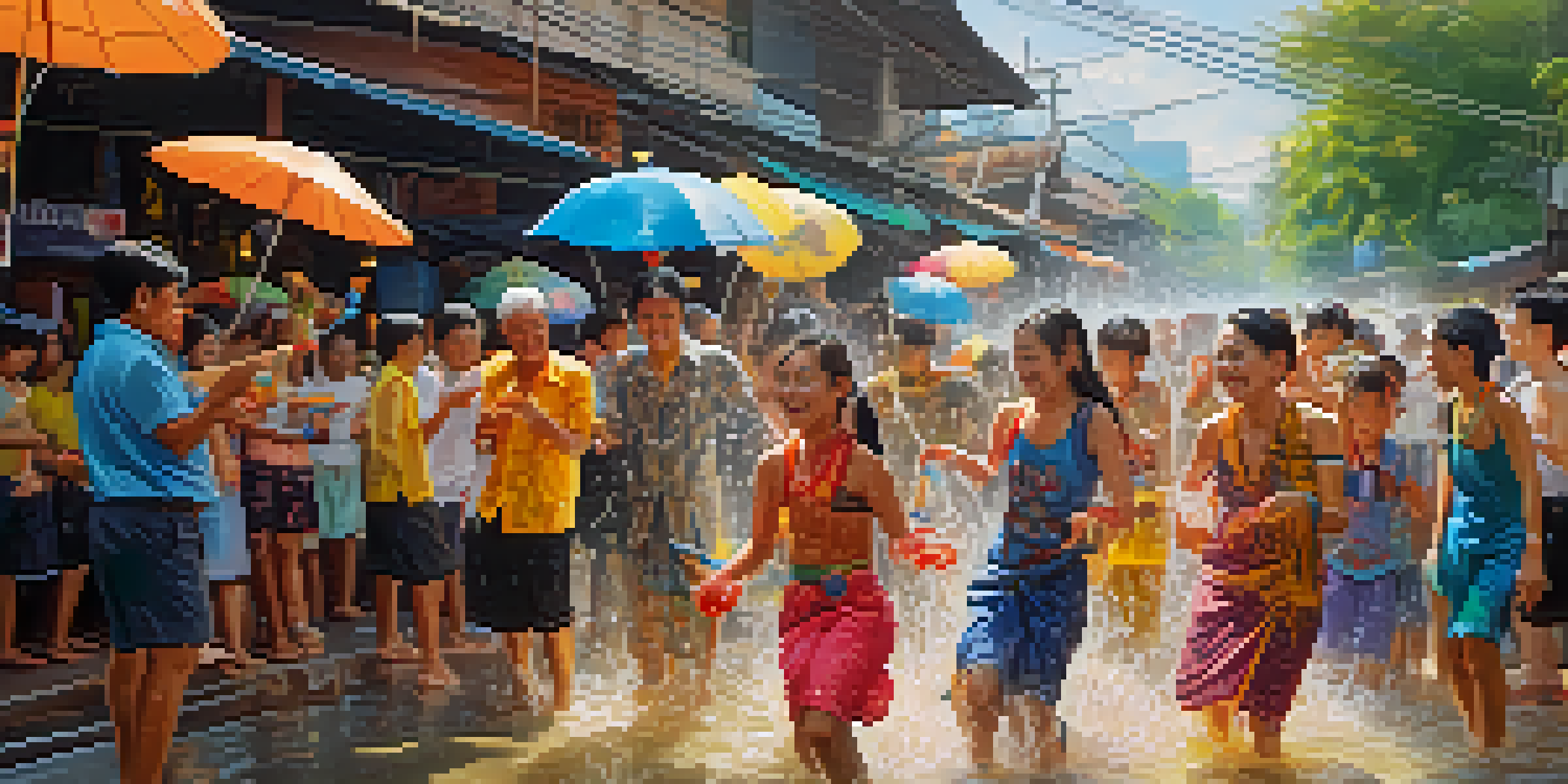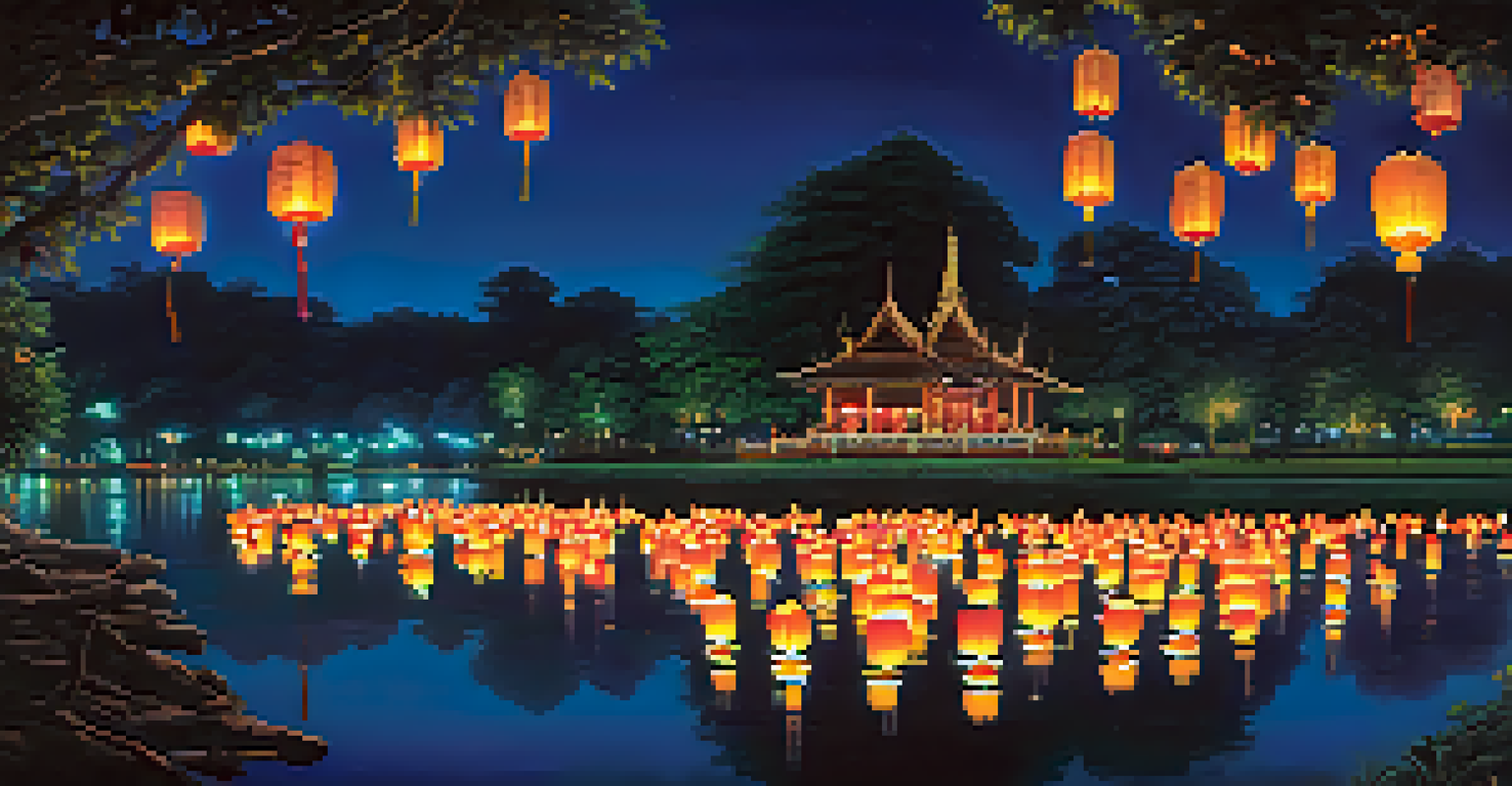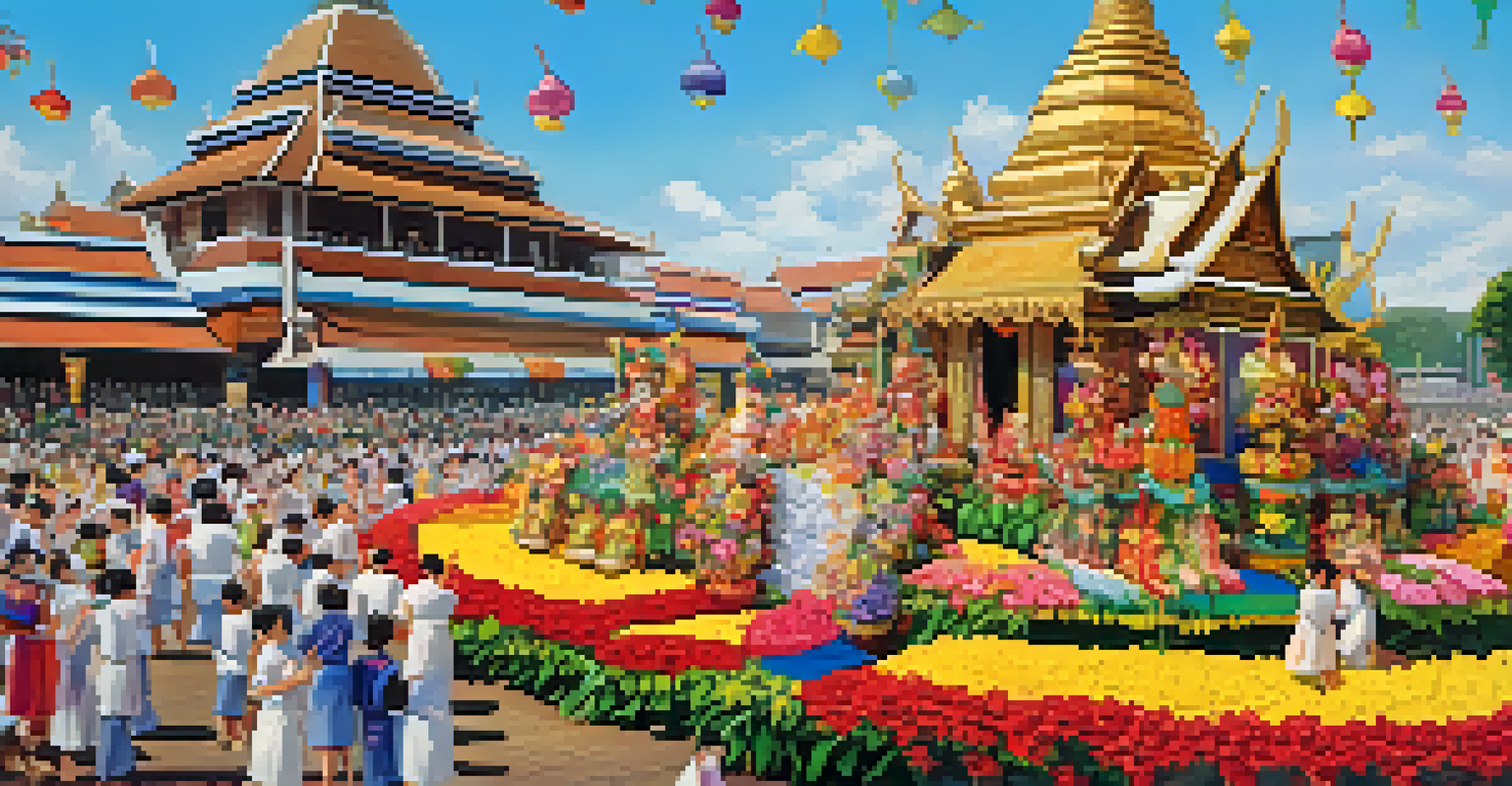An Overview of Thailand's Vibrant Festivals Throughout the Year

Songkran: The Joyful Thai New Year Water Festival
Songkran marks the Thai New Year, celebrated every April. This lively festival is famous for its water fights, where locals and tourists alike splash water on each other as a way to wash away the past year's misfortunes. Streets transform into a massive water play zone, filled with laughter and joy.
The true spirit of celebration lies in the joy of togetherness and the respect for traditions.
Beyond the fun, Songkran has deep cultural roots. Traditionally, it involves pouring water over Buddha statues and the hands of elders, symbolizing respect and purification. It's a beautiful blend of modern festivities and ancient customs that makes it unique.
As the days of Songkran unfold, you'll find parades, traditional dances, and even sand pagoda building competitions in temples. It's an unforgettable experience that showcases Thailand's vibrant culture and sense of community.
Loy Krathong: A Festival of Lights and Forgiveness
Loy Krathong, usually held in November, is one of Thailand's most enchanting festivals. During this night of lights, people release floating lanterns on rivers and lakes, creating a stunning spectacle. Each lantern, or 'krathong,' symbolizes letting go of negativity and making wishes for the future.

The festival's origins trace back to ancient traditions, where it was celebrated to thank the water spirits for a bountiful harvest. Today, it’s a time for reflection and renewal, allowing participants to express their hopes and dreams.
Songkran Celebrates New Beginnings
The Songkran festival, marking the Thai New Year in April, combines joyful water fights with deep-rooted traditions of respect and purification.
As you wander through the streets during Loy Krathong, the atmosphere is electric with joy. Markets are filled with vibrant handicrafts, traditional food, and music, making it a feast for the senses. It’s a magical experience that draws both locals and visitors together.
Chiang Mai Flower Festival: Nature's Colorful Showcase
Every February, the Chiang Mai Flower Festival blooms into life, celebrating the beauty of nature. This vibrant festivity showcases stunning floral displays and extravagant parades featuring elaborate floats adorned with flowers. It’s a visual delight that attracts flower enthusiasts from around the world.
Festivals are not just celebrations; they are a reflection of our culture and a reminder of our roots.
The festival not only highlights the region's rich horticultural heritage but also brings the community together. Local artists and craftsmen showcase their talents, making it a perfect opportunity to experience Thai culture through art and creativity.
Visitors can participate in various activities, such as flower arranging workshops and tasting local delicacies. The Chiang Mai Flower Festival is a true testament to the charm and beauty of Thailand’s landscapes and its people.
Buddhist Lent: A Time for Reflection and Spiritual Growth
Buddhist Lent, or 'Vassa,' typically occurs during the rainy season from July to October. It’s a sacred time when monks retreat into monasteries to meditate and study the teachings of Buddha. For many Thai people, it's a period of reflection and spiritual growth.
During this time, communities engage in acts of merit, such as offering food to monks and participating in temple activities. This deepens their connection to their faith and highlights the importance of community support.
Loy Krathong's Magical Lanterns
Loy Krathong, held in November, is a stunning festival where floating lanterns symbolize letting go of negativity and making wishes for the future.
As the end of Lent approaches, the festival of Kathina is celebrated, where offerings of robes and other necessities are made to the monks. It’s a beautiful reminder of generosity and compassion that resonates deeply within Thai culture.
Phi Ta Khon: The Ghost Festival of Dan Sai
Phi Ta Khon, celebrated in the Dan Sai district, is a unique festival that combines elements of Thai culture and folklore. Often referred to as the Ghost Festival, it features colorful masks and costumes, with participants reenacting stories of spirits and the afterlife. The festival usually takes place in June and has a playful yet spiritual ambiance.
Originating from local beliefs, Phi Ta Khon is believed to invite spirits back to the village. The vibrant processions and lively parades filled with music and dance create an atmosphere of joy and celebration.
This festival is not just about the entertainment; it also serves as a reminder of respecting ancestors and the spiritual world. The unique blend of tradition and celebration makes Phi Ta Khon a must-see for anyone looking to dive deep into Thailand's cultural fabric.
Vegetarian Festival: A Culinary and Spiritual Journey
The Vegetarian Festival, celebrated primarily in Phuket, is a colorful event that usually occurs in October. It’s a time when many locals abstain from meat and partake in a 10-day vegetarian diet to purify the body and soul. This festival is not only about food but also about spiritual cleansing and devotion.
During this time, vibrant parades fill the streets, showcasing cultural performances and traditional rituals. Participants often dress in white clothing and engage in various acts of devotion, including fire-walking and body piercing, as expressions of faith.
Cultural Richness of Thai Festivals
Thailand's festivals, from the Chiang Mai Flower Festival to the Vegetarian Festival, showcase the country's vibrant culture, community spirit, and spiritual traditions.
Food stalls offering a variety of vegetarian dishes line the streets, making it a delightful experience for food lovers. The Vegetarian Festival is a fascinating blend of culinary delight and spiritual significance, inviting everyone to join in the celebration.
King Bhumibol's Birthday: A National Celebration of Unity
Celebrated on December 5th, King Bhumibol's Birthday is a significant national holiday in Thailand. This day honors the beloved late king, who was known for his dedication to improving the lives of his people. The celebrations are marked by displays of loyalty and gratitude from the Thai people.
On this day, many participate in activities that promote unity, such as candlelight vigils, parades, and cultural performances. The atmosphere is filled with a sense of pride and appreciation for the king's contributions to the nation.

This celebration is not just a remembrance; it’s a day that brings the nation together in reflection and gratitude. It highlights the strength and resilience of the Thai spirit, making it a heartfelt occasion for all.
New Year Celebrations: A Festive Welcome to New Beginnings
Thailand rings in the New Year with vibrant celebrations, most famously the Songkran water festival, but there’s more to it. Thai New Year, or 'Songkran,' occurs in April and is a time for family reunions, visits to temples, and festive gatherings. It’s a period filled with joy, hope, and new beginnings.
People often engage in traditional activities, such as pouring water over Buddha statues and sprinkling water on family members as a sign of blessing. This reflects the cultural importance of cleansing and renewal as the new year approaches.
As the clock strikes midnight, fireworks light up the sky, and celebrations continue with music, dance, and feasting. The New Year festivities in Thailand are a lively reminder of the importance of family, community, and cultural heritage.